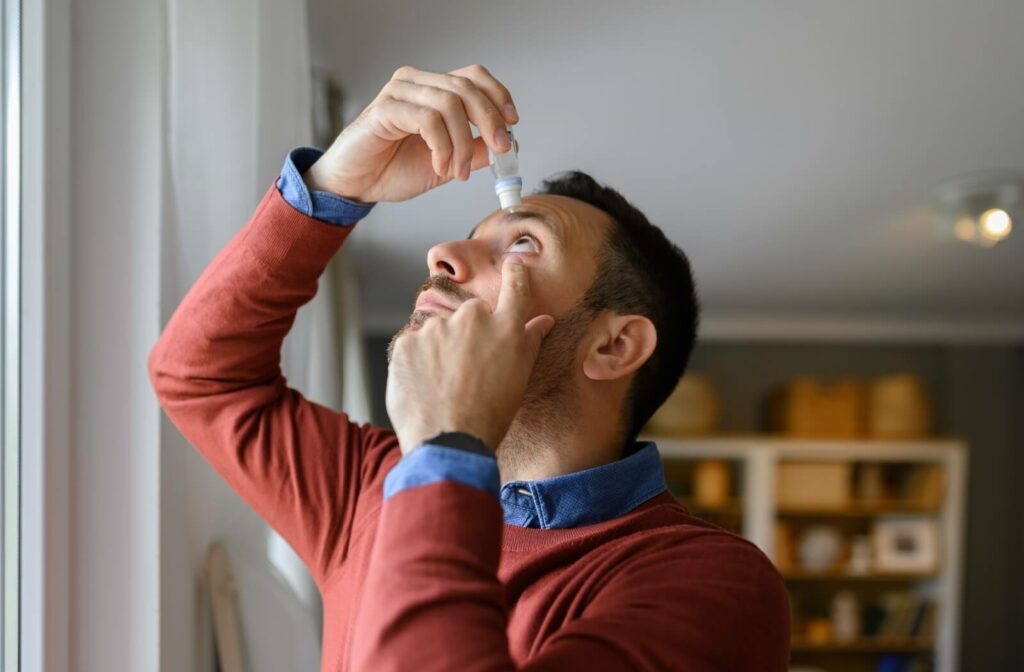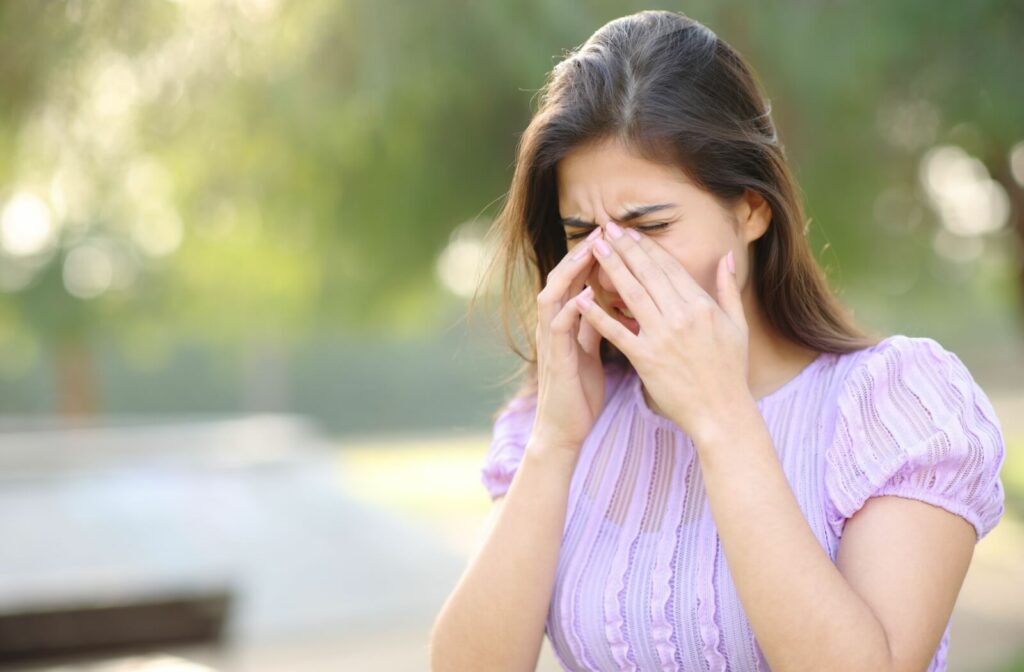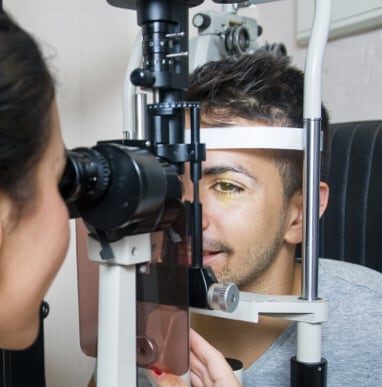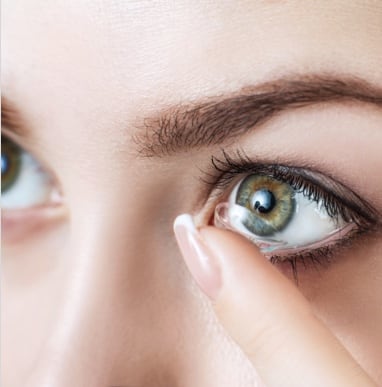Have you ever found yourself rubbing your eyes incessantly, wondering why they itch so much? If so, you’re not alone. Itchy eyes are a common issue that affects millions of people worldwide. The discomfort can be more than just a minor annoyance—it can disrupt daily activities and impact your overall quality of life.
Itchy eyes happen when an outside factor causes more irritation than your eye is capable of washing away. Some of the most common reasons for itchy eyes are allergic reactions, environmental irritants, dry eye syndrome, and digital eye strain (also known as computer vision syndrome).. Infections like conjunctivitis (pinkeye) can also cause itchy eyes.
Understanding Itchy Eyes
Normally, your eyes are covered by a layer of fluid called the tear film. The tear film keeps your eyes from drying out, as well as trapping and washing away small objects like dust particles to prevent them from damaging the surface of your eye.
Itchy eyes happen when irritants overwhelm your tear layer’s ability to protect and lubricate your eyes. When irritants like allergens come into contact with the sensitive surface of your eye and aren’t removed right away, they can dry out and even damage the surface of your eye, causing it to feel itchy.
One of the most common culprits behind itchy eyes is allergens. Pollen, dust, and pet dander can all trigger allergic reactions that make your eyes itchy and uncomfortable. Environmental irritants like smoke, pollution, and even strong odors can also contribute to itchy eyes. These irritants can cause inflammation and discomfort, making it difficult to keep from rubbing your eyes. Over time, exposure to these elements can lead to chronic eye irritation if not properly managed.
Health-related factors such as dry eye syndrome and infections like conjunctivitis can also be to blame for itchy eyes. Instead of there being too many irritants in the environment for your normal tear film to handle, the tear film is depleted, which leads to the same result. Dry eye syndrome occurs when your eyes don’t produce enough tears, or the tears evaporate too quickly. Infections like conjunctivitis (pink eye) can also cause severe itching, along with other symptoms like redness and discharge.
How to Distinguish Different Types of Eye Itch
It’s essential to recognize the different types of eye itch to determine the appropriate treatment. Allergic reactions often come with additional symptoms like sneezing, a runny nose, and watery eyes. If you notice these signs along with your itchy eyes, allergies are likely the cause.
Dry eye syndrome, on the other hand, may present symptoms such as a gritty sensation, blurred vision, and sensitivity to light. If you find that your eyes feel dry and uncomfortable throughout the day, especially in air-conditioned or windy environments, dry eye syndrome might be the issue.
Infections like conjunctivitis usually come with more severe symptoms, including redness, swelling, and discharge. If you experience these signs, it’s crucial to seek professional medical help to prevent the infection from spreading and causing further complications.
Practical Tips for Preventing Eye Itch
Taking proactive steps can significantly reduce the likelihood of experiencing itchy eyes. One of the easiest ways to prevent eye itch is to avoid known allergens. If pollen is a trigger for you, try to stay indoors on high pollen days and use air purifiers to keep indoor air clean.
Using protective eyewear can shield your eyes from irritants like dust and smoke. Sunglasses with UV protection can also help minimize exposure to harmful rays that can irritate your eyes.
Keeping your hands clean is another simple yet effective way to prevent eye itch. Our hands come into contact with countless germs and irritants throughout the day, and touching your eyes can transfer these particles, leading to itchiness and discomfort.
Managing Mild Cases at Home

For mild cases of itchy eyes, several home remedies can offer relief. Applying cool compresses to your eyes can help reduce inflammation and soothe the itch. Soak a clean cloth in cool water, wring out the excess, and place it over your closed eyes for a few minutes.
Over-the-counter antihistamine eye drops can also help manage allergy-related eye itch. These drops work by blocking the action of histamines, the chemicals responsible for allergic reactions, and can provide quick relief.
Maintaining good eye hygiene is crucial for preventing and managing itchy eyes. Make sure to remove makeup before bed, clean your eyelids gently with a warm washcloth, and avoid sharing personal items like towels and pillowcases to reduce the risk of infections.
Professional Treatments
When home remedies aren’t enough to alleviate your itchy eyes, professional medical treatments may be necessary. Your optometrist can offer various treatments based on the underlying cause of your eye itch.
For severe allergic reactions, prescription antihistamine or corticosteroid eye drops may be recommended. These medications can provide more potent relief compared to over-the-counter options and are tailored to address specific allergic responses.
If dry eye syndrome is the issue, your optometrist might suggest artificial tears or prescription medications that help increase tear production. In some cases, procedures like punctal plugs, which block tear drainage channels, may be performed to help retain moisture in your eyes.
Infections like conjunctivitis require prompt medical attention. Your eye care provider will prescribe medications to treat the infection and prevent it from spreading. It’s essential to follow your doctor’s instructions carefully to ensure the infection is fully resolved.
We Can Help You Solve Itchy Eyes
Itchy eyes can be a frustrating and uncomfortable problem, but understanding the causes and available treatments can help you find relief. By taking proactive measures to prevent eye itch and seeking professional care when necessary, you can maintain good eye health and improve your overall quality of life.Your eyes deserve the best care, and Vision Care Center is here to help you achieve optimal eye health. For more information on eye care, book an exam with one of our optometrists today.












